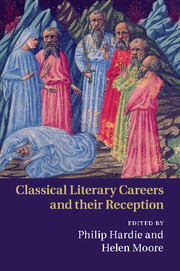Book contents
- Frontmatter
- Contents
- List of contributors
- Preface
- Note on the text
- Introduction: Literary careers – Classical models and their receptions
- 1 Some Virgilian unities
- 2 There and back again: Horace's poetic career
- 3 The Ovidian career model: Ovid, Gallus, Apuleius, Boccaccio
- 4 An elegist's career: from Cynthia to Cornelia
- 5 Persona and satiric career in Juvenal
- 6 The indistinct literary careers of Cicero and Pliny the Younger
- 7 Re-inventing Virgil's Wheel: the poet and his work from Dante to Petrarch
- 8 Did Shakespeare have a literary career?
- 9 New spins on old rotas: Virgil, Ovid, Milton
- 10 Bookburning and the poetic deathbed: the legacy of Virgil
- 11 Literary afterlives: metempsychosis from Ennius to Jorge Luis Borges
- 12 ‘Mirrored doubles’: Andrew Marvell, the remaking of poetry and the poet's career
- 13 Dryden and the complete career
- 14 Goethe's elegiac sabbatical
- 15 Wordsworth's career prospects: ‘peculiar language’ and public epigraphs
- Epilogue: Inventing a life – a personal view of literary careers
- List of works cited
- Index
3 - The Ovidian career model: Ovid, Gallus, Apuleius, Boccaccio
Published online by Cambridge University Press: 10 November 2010
- Frontmatter
- Contents
- List of contributors
- Preface
- Note on the text
- Introduction: Literary careers – Classical models and their receptions
- 1 Some Virgilian unities
- 2 There and back again: Horace's poetic career
- 3 The Ovidian career model: Ovid, Gallus, Apuleius, Boccaccio
- 4 An elegist's career: from Cynthia to Cornelia
- 5 Persona and satiric career in Juvenal
- 6 The indistinct literary careers of Cicero and Pliny the Younger
- 7 Re-inventing Virgil's Wheel: the poet and his work from Dante to Petrarch
- 8 Did Shakespeare have a literary career?
- 9 New spins on old rotas: Virgil, Ovid, Milton
- 10 Bookburning and the poetic deathbed: the legacy of Virgil
- 11 Literary afterlives: metempsychosis from Ennius to Jorge Luis Borges
- 12 ‘Mirrored doubles’: Andrew Marvell, the remaking of poetry and the poet's career
- 13 Dryden and the complete career
- 14 Goethe's elegiac sabbatical
- 15 Wordsworth's career prospects: ‘peculiar language’ and public epigraphs
- Epilogue: Inventing a life – a personal view of literary careers
- List of works cited
- Index
Summary
THE OVIDIAN CAREER
Ovid has the historical privilege of being next in line and the first to react to what had been the boom in poetic self-reference and auto(bio)graphy in the times of Catullus, Virgil, Propertius and Horace. He is also the one who does the most to continue Horace's invention of a ‘literary system’ and a ‘school’ and an ‘Augustan age’ model of Roman poetry (compare e.g. Horace, Serm. 1.10.31–50 with Ovid, Tristia 4.10.41–56; Ex Ponto 4.16.5–40).
Furthermore, Ovid is unique in ancient literature for the sheer number and quasi-systematic regularity of autographic situations: in his extant production, every single work (with the exception of genres that cannot accommodate authorial self-expression: his heroic epic, and presumably his lost tragedy Medea) has a space of self-expression and, often, of recapitulation. Equally important, there is no single poetic text by Naso that remains ‘unsigned’, either through the inclusion of the author's name, or by explicit reference in another Ovidian text, or, often, both. In other words, there is almost no Ovidian poem that remains unacknowledged. Even more important, in a number of cases his texts ‘talk to each other’ (Hinds 1985; Barchiesi 2001; compare Frings 2005), with the result that each work is positioned within a career: for example, the Fasti engage the earlier elegiac/erotic work with the question ‘Who would believe that a path could lead from there to here?’ (2.8).
- Type
- Chapter
- Information
- Classical Literary Careers and their Reception , pp. 59 - 88Publisher: Cambridge University PressPrint publication year: 2010
- 9
- Cited by



